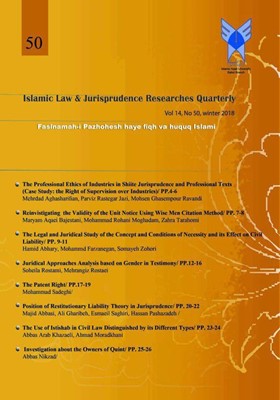The Use of Istishab in Civil Law Distinguished by its Different Types
Subject Areas : Private law
Abbas Arab Khazaeli
1
,
Ali Reza Asgari
2
*
,
Ahamd Moradkhani
3
![]()
1 - Ph.D in Islamic Law & Jurisprudence, Sari Branch, Islamic Azad University, Sari, Iran
2 - Assistant Professor, Qom Branch, Islamic Azad University, Qom, Iran
3 - Assistant Professor, Qom Branch, Islamic Azad University, Qom, Iran
Keywords: Istishab, Subject doubts, Mistake of law, Mistake of fact, Arbitrary and obstructive,
Abstract :
The subsidiary religious laws, in the sacred Islamic law, are extracted and inferred using the book (Quran), tradition, consensus (among Fokaha) and wisdom. However, it is very general in nature and no more specific details had been set from the beginning. The great mujtahids and scholars of Fiqh embarked upon the problem in order to solve it. Accordingly, Istishab is considered as one of the oft-used principles in this respect. It is where a situation existing previously is presumed to be continuing at present, although there is some doubt, it presumes the continuation of the fact until the contrary is proven. For example: we know that someone was certainly alive in 1971, and was missed in 1991 when his father died. Doubt arises as to whether a man is still alive and can inherit his father's wealth? The previous certainty, in this case, is presumed to be continuing at present that he is known to have been alive. In case of doubt, on the contrary, it is assumed that he is deceased. However, by istishab, the presumption will be that the death is not proven. Because the principle of Istishab, has a privileged position in civil law and Imamieh jurisprudence. The purpose of this study was to analyze the role of Istishab in civil law and Imamieh jurisprudence.
- امامی، حسن، (1365)، حقوق مدنی، کتابفروشی اسلامیه، تهران.
2- انصاری، شیخ مرتضی بن محمد، (137)، فوائدالأصول (رسائل)، محشی، چاپ قم.
3- جوهری، اسماعیل بن حماد، (1404)، صحاح اللغه، تحقیق احمد بن عبدالغفور عطار، مطابع دارالکتب العربی، مصر.
4- حکیم، محمدتقی(علامه)، (1993)، الأصول العامه للفقه المقارن، دارالاندلس، بیروت.
5- حیدری، سید علی نقی، (1418)، اصول الاستنباط، مؤسسه النشر الاسلامی، قم، چاپ دوم.
6- خراسانی، مولی محمدکاظم، (1417)، محاضرات فی اصول الفقه (تقریر محمد اسحاق فیاض)، دارالکتب العلمیه، قم.
7- خراسانی، مولی محمدکاظم، (1414)، کفایه الأصول، مؤسسه النشر الاسلامی، نجف، چاپ دوم.
8- خمینی (امام)، سید روحالله بن مصطفی الموسوی، (1364)، تحریر الوسیله، دارالعلم، قم، چاپ دوم.
9- خمینی (امام)، سید روحالله بن مصطفی الموسوی، (1414)، مناهج الوصول الی علم الأصول، مؤسسه تنظیم و نشر آثار امام خمینی، تهران.
10- خویی، سیدابوالقاسم بن سید علی اکبر موسوی، (1386)، مصباح الاصول(تقریر محمد سرور الواعظ)، نجف مطبعه، نجف.
11- سبحانی، جعفربنمحمدحسین، (1419)، المحصول فی اصول الفقه (تقریر سید محمود جلالی مازندرانی)، مؤسسه الامام الصادق (ع)، قم.
12- سبحانی، جعفربن محمدحسین، (1421)، الموجز فی اصول الفقه، مؤسسه الامام الصادق (ع)، قم، چاپ پنجم.
13- شابطی، ابواسحاق، (1420)، الموافقات فی اصول الفقه، مکتبه التجاریّه، مصر، چاپ دوم.
14- شهابی، محمود، (1358)، تقریرات اصول فقه، کتابفروشی خیام، تهران.
15- طوسی، شیخ ابوجعفر محمدبن حسن، (1312)، عدّه الأصول، بمبئی، چاپ اول.
16- غروی نائینی (آیتالله)، محمد حسین، (1365)، فوائد الاصول (تقریر محمد علی کاظمی خراسانی)، مؤسسه النشر الاسلامی، قم.
17- کاتوزیان، ناصر، (1378)، فلسفه حقوق، انتشارات گنج دانش، تهران، چاپ دوم.
18- محمدی، ابوالحسن، (1375)، مبانی استنباط حقوق اسلامی، انتشارات دانشگاه تهران، تهران، چاپ چهارم.
19- مظفر، علامه شیخ محمدرضا، (1403)، اصول الفقه، دارالتعارف، بیروت، چاپ چهارم.
20- مغنیه، محمدجواد، (1975)، اصول الفقه فی ثوبه الجدید، بیروت، دارالعلم.
21- ملکی، میرزا حبیبالله، (1415) تلخیص الاصول، انتشارات مصطفوی، تهران.
_||_
1. Ansari, S.M. M. (754 AD). Favaedol Usul (Rasael). Mohshi: Qom Publication.
2. Gharavi Naeini, M. H. (1986). Fawaid Al-Usul. Qom: Al-Nashr Al-Islamic Publication.
3. Hakim, M. T. (1993). Usul Allameh Al fiqh Al -Muqaran. Beirut: Dar Al-Andalus.
4. Heydari, S. A. N. (1997). Usul Al-Istinbat (2nd). Qom: Al-Nashr Islamic Publication.
5. Imami, H. (1986). Civil rights. Tehran: Islamiyah Bookstore.
6. Juhari, I. H. (1984). Saha'ah Al-Lughah: A study by Ahmad bin Abdul Ghafour Attar. Egypt: Dar Al-Kotob Arabia.
7. Katoozian, N. (1999). The philosophy of law. Tehran: Ganj Danesh Publication.
8. Khoei, S.A.M. (2007). Mesbah al-Usool. Najaf : Mutai'ah
9. Khomeini, S. R. (1985). Tahrir Al-Wasilah. Qom: Dar Al-Ilm.
10. Khomeini, S.R. (1993). Minhaj Al-Wosool Ila Ilem Osoul. Tehran: Institute for Compilation and Publication of Imam Khomeini's Works.
11. Khorasani, M. M. K. (1993). Kifayah Al-Usul. Qom: Al-Nashr al-Islamic Publication.
12. Khorasani, M. M. K. (1996). Mohazerat Fi Usul Al-Fiqh. Qom: Dar Al Kotob Al Ilmiyah.
13. Maleki, M.H. (1994). Talkhees Usoul. Tehran: Mostafavi Publication.
14. Mohammadi, A. (1996). Principles of Islamic law. Tehran: Tehran University Press.
15. Mozaffar, A. M. R. (1983). Principles of Islamic jurisprudence (Uṣūl al-fiqh). Beirut: Dar Al-Taarof
16. Mughniyeh, M. J. (1975). Usul Al-Fiqh Fi Thawbihi Al-Jadid. Beirut: Dar Al-Iam.
17. Shabeti, A. I. (1999). Al-Muwafaqat Fi Usul Al-Fiqh. Egypt: Al-Maktabah Al-Tejarieh.
18. Shahabi, M. (1979). The principles of jurisprudence (usul al-fiqh). Tehran: Khayyam Book Store Publishing Center.
19. Sobhani, J. M. (1998). Al-Mahshul Fi Ushul Al-Fiqh. Qom : Imam Al-Sadiq (AS) Institute.
20. Sobhani, J. M. (2000). Al-Mujaz Fi Usul al-Fiqh (5th ed.). Qom: Imam Al-Sadiq (AS) institute.
21. Tusi, S.A. J. (1933). Uddat al-Uṣūl. India: Mumbai.

